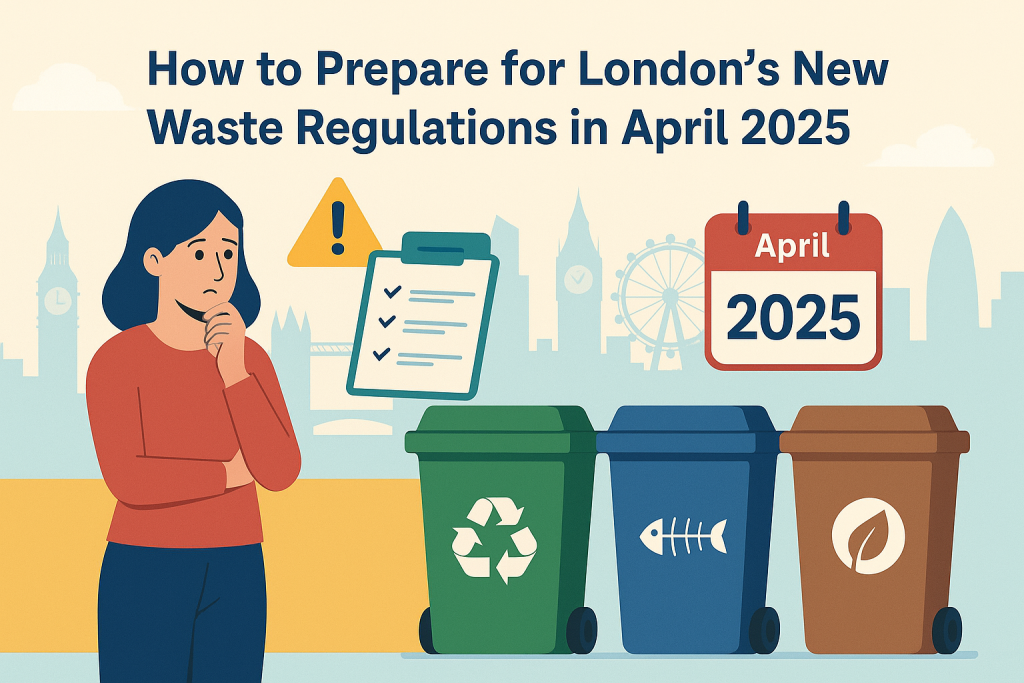
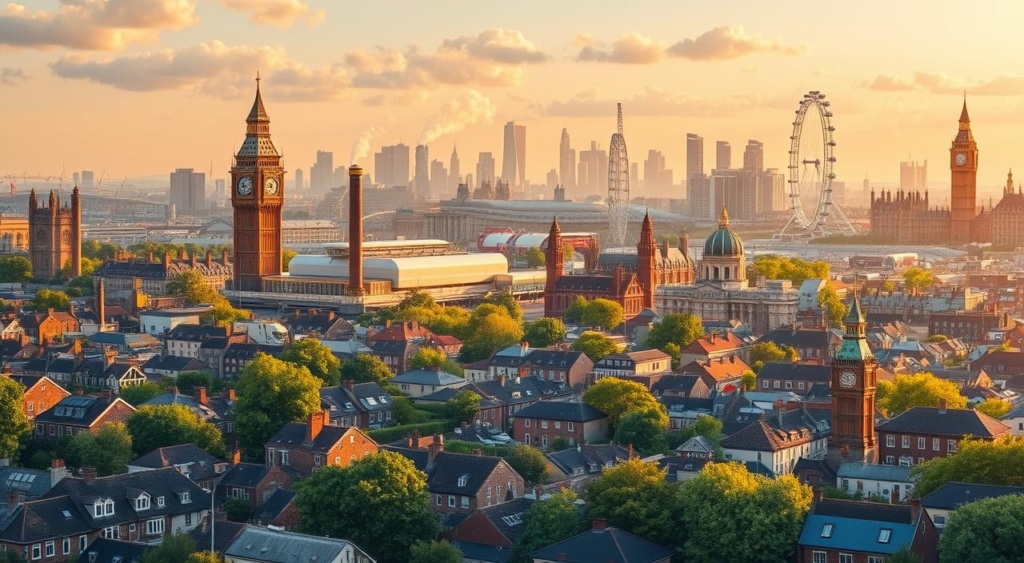 Residents and businesses must prioritise professional rubbish removal services to meet the regulations. Embracing environmentally friendly waste removal methods now will simplify the transition. This guide outlines actionable steps to ensure smooth compliance while supporting the city’s sustainability targets.
Residents and businesses must prioritise professional rubbish removal services to meet the regulations. Embracing environmentally friendly waste removal methods now will simplify the transition. This guide outlines actionable steps to ensure smooth compliance while supporting the city’s sustainability targets.Key Takeaways
- New waste regulations begin in April 2025, impacting all Londoners.
- Professional rubbish removal experts can assist with compliance.
- Strict recycling standards and altered collection times will apply.
- Adopting eco-friendly practices reduces penalties and supports the environment.
- Proactive planning ensures households and businesses avoid disruptions.
Understanding London’s Waste Management Policies
London’s waste management policies are key to the city’s green plan. They guide how we deal with waste disposal and rubbish removal. Let’s look at how these policies work and why they’re important.
Overview of Waste Management Goals
The city wants to recycle 65% of waste by 2030. It also aims to cut landfill use by 40% by 2025. These goals help reduce carbon emissions from waste disposal processes. The main objectives include:
- Phasing out single-use plastics
- Expanding recycling infrastructure
- Encouraging composting programs
Historical Context of Waste Regulations
London’s policies have changed over time. Here’s a brief history:
| Year | Policy | Impact |
|---|---|---|
| 2003 | London Waste Strategy | Set first citywide recycling targets |
| 2015 | Landfill Tax Hike | Incentivised rubbish removal through cost penalties |
| 2020 | Plastic-Free London Plan | Banned non-recyclable packaging in public spaces |
Importance of Compliance
Following waste rules is more than just avoiding fines. It protects our environment. Businesses could face £500-£5,000 fines if they don’t comply. Residents might lose access to recycling if they don’t follow the rules.
Key Changes in the 2025 Waste Regulations
London’s 2025 waste rules bring big changes. They focus on recycling, smarter garbage collection, and less landfill use. Here are the main changes affecting everyone: https://youtu.be/4ZOALvPuOFI
New Recycling Rules Take Effect
Recycling rules are getting stricter:
- All plastics, glass, and metals must be separated from general waste.
- Items like plastic bags and styrofoam are now banned from regular bins-debris removal for these must follow recycling channels.
- Businesses and households face a 65% minimum recycling target by 2025.
Garbage Collection Schedules Redefined
Collection times and methods are changing:
- Some boroughs will reduce non-recyclable waste collections to every two weeks.
- Check your local council’s website for updated pickup dates and times.
- Businesses must schedule pickups via new online portals to meet compliance.
Landfill Restrictions Intensify
New landfill rules aim to reduce landfill use:
- Items like textiles and wood can no longer be sent to landfills-waste disposal must follow recycling paths instead.
- Landfill costs will rise by up to 40% for non-compliant waste.
- London aims to cut landfill use by 30% by 2030, aligning with UK sustainability goals.
How the Regulations Affect Households
London’s new waste rules change how we handle rubbish. You’ll see changes in when and how waste is collected. Here’s what you need to know to follow the rules and help the planet.
New Responsibilities for Residents
From April 2025, sorting waste gets stricter. You’ll need separate bins for food, plastics, and recyclables. Items like batteries and electronics must go to special centres, not the bin. Some areas will make composting food waste a must. You’ll get free bins to do this.
Guidelines for Proper Waste Segregation
Sorting waste is easier with these tips:
- Put glass, metal, and clean plastics in recycling bins. No plastic bags or food-stained items.
- Wrap sharp or dirty waste well before throwing it away.
- Use council bins for food waste.
- Check labels: items with mixed materials go to general waste.
Local councils will give out free guides and online tools. Making mistakes is okay, but trying hard helps London’s environment.
Implications for Businesses in London
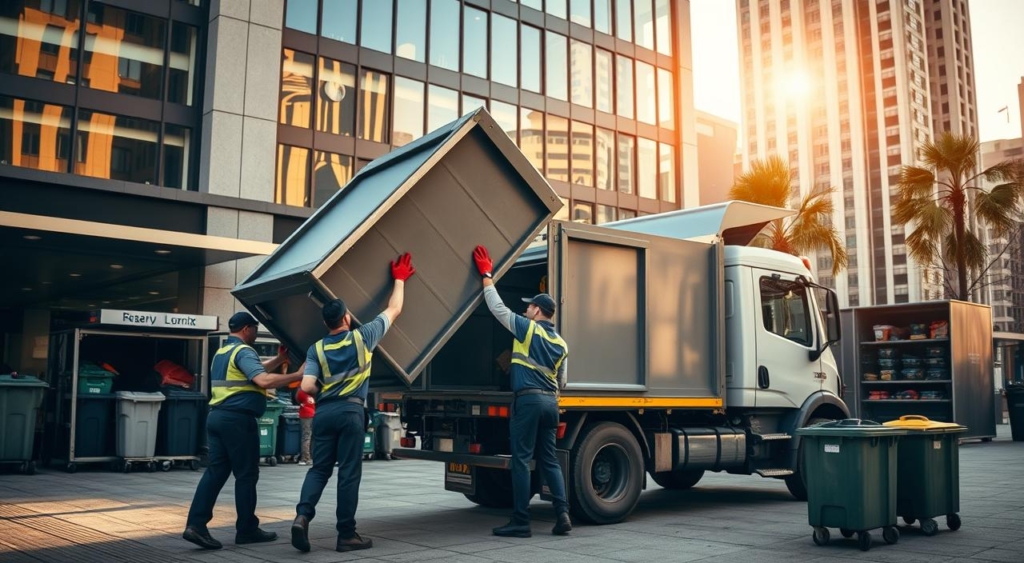 London’s 2025 waste rules mean big changes for businesses. Following these rules is not just a must-it’s smart business. Here’s how to get ready.
London’s 2025 waste rules mean big changes for businesses. Following these rules is not just a must-it’s smart business. Here’s how to get ready.
Compliance Requirements for Enterprises
| Business Type | Requirements |
|---|---|
| Small businesses | Quarterly waste audits and basic reporting |
| Large enterprises | Annual audits, digital reporting systems, and staff training |
| Food industries | Food waste tracking and composting partnerships |
Regular waste checks are key. Many businesses hire experts to meet these standards. The hospitality sector has stricter rules for organic waste.
Penalties for Non-Compliance
- Fixed monetary penalties start at £300 for minor breaches.
- Repeated violations can lead to losing business licenses.
- Non-compliant firms will be listed publicly.
Ignoring these rules can cost a lot. It can also harm your reputation and customer trust.
Benefits of Adopting Sustainable Practices
Using cleanout services or new waste solutions can save money. Recycling can cut landfill costs by up to 30%. It also attracts eco-conscious customers. Companies like Whole Foods and Tesco see more sales and loyalty by using green waste management. It’s not just about avoiding fines-it’s about leading in sustainability.
The Role of Technology in Waste Management
London’s updated waste management policies are driving innovation. Technology is key to making waste removal easier and greener. From apps to sensors, these tools are changing the game.
Innovative Waste Tracking Solutions
Track and tackle waste with these tech tools:
- IoT Sensors: Monitor bin levels in real time to improve collection routes.
- Compliance Apps: Digital logs make meeting requirements easy.
- Data Dashboards: Visualise waste patterns to cut costs and emissions.
Smart Recycling Bins
Modern bins are smarter than ever: They come with sensors and AI:
- Sort materials automatically, reducing contamination.
- Notify collectors when bins are full, saving trips.
- Offer rewards for correct usage, encouraging participation.
Companies like Bigbelly use these systems worldwide. Residents can even schedule pickups through apps, helping London meet its 2025 goals.
Community Engagement and Awareness
Creating a greener future is a team effort. London’s waste management policies need everyone’s help to work. Local leaders and residents must work together to make these rules a part of daily life. 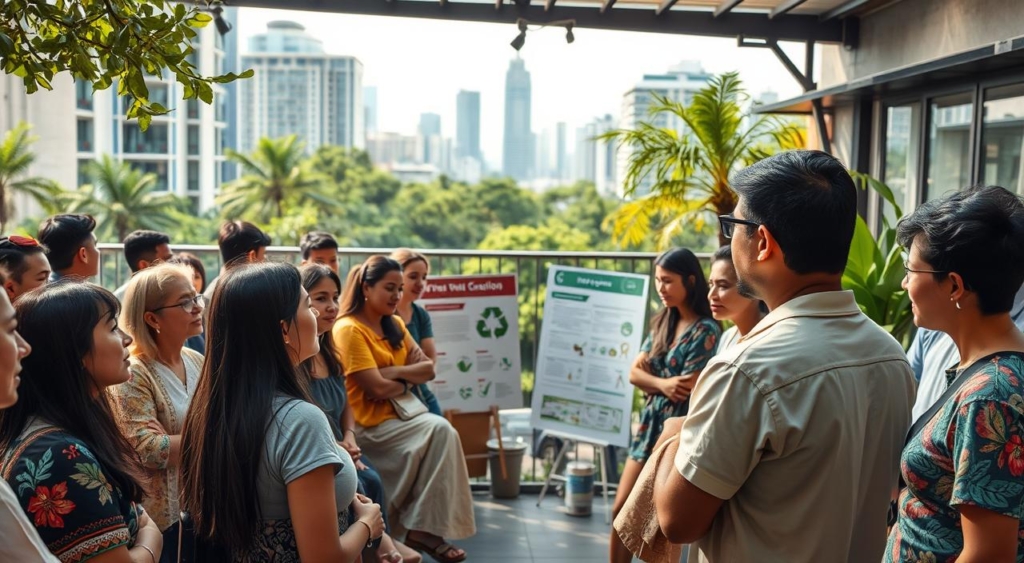
- School programs teach kids about sorting rubbish through games and art.
- Free guides offer tips on environmentally friendly waste removal for homes and gardens.
- Neighbourhood drop-in centres give one-on-one advice on recycling.
Events help turn knowledge into action:
| Event Type | Focus | Impact |
|---|---|---|
| Workshops | Sorting demos | Hands-on learning |
| Family days | Interactive games | Engages all ages |
| Q&A sessions | Policy questions | Clarifies requirements |
Local libraries and parks are great places for these events. Working with groups like Recycle Now or WRAP adds credibility. Small steps can inspire others to improve their rubbish removal habits. Let’s make 2025 the year London comes together for cleaner streets and a healthier planet!
Collaborating with Local Authorities
Effective waste management in London needs teamwork. Building strong ties with city officials ensures smoother transitions to new waste disposal rules. Proactive engagement helps address concerns early and align practices with updated guidelines.
Building Relationships with City Officials
Start by attending local council meetings or waste management briefings. Share insights on challenges faced during garbage collection or professional rubbish removal to highlight practical concerns. Many waste management firms already work closely with authorities-partnering with them can streamline compliance efforts.
- Request meetings with environmental health officers to discuss specific needs.
- Join official waste strategy forums to voice community priorities.
- Ask authorities for clarity on how to improve recycling infrastructure.
Participating in Public Consultations
Public consultations are chances to shape policies. Submit written feedback on proposed changes to waste disposal systems or garbage collection routes. Propose ideas like extended collection times or better access to recycling points.
- Review consultation documents carefully before submitting input.
- Collaborate with neighbours to submit joint suggestions.
- Follow up after consultations to track how feedback influences decisions.
Local authorities aim to balance efficiency and sustainability-your input helps them achieve this. Proactive communication fosters mutual understanding, making compliance easier for all.
Strategies for Effective Waste Management
Turning compliance into action starts with clear strategies tailored to your needs. London’s waste management policies demand proactive steps to handle junk removal and debris removal efficiently. Here’s how to build a system that works: 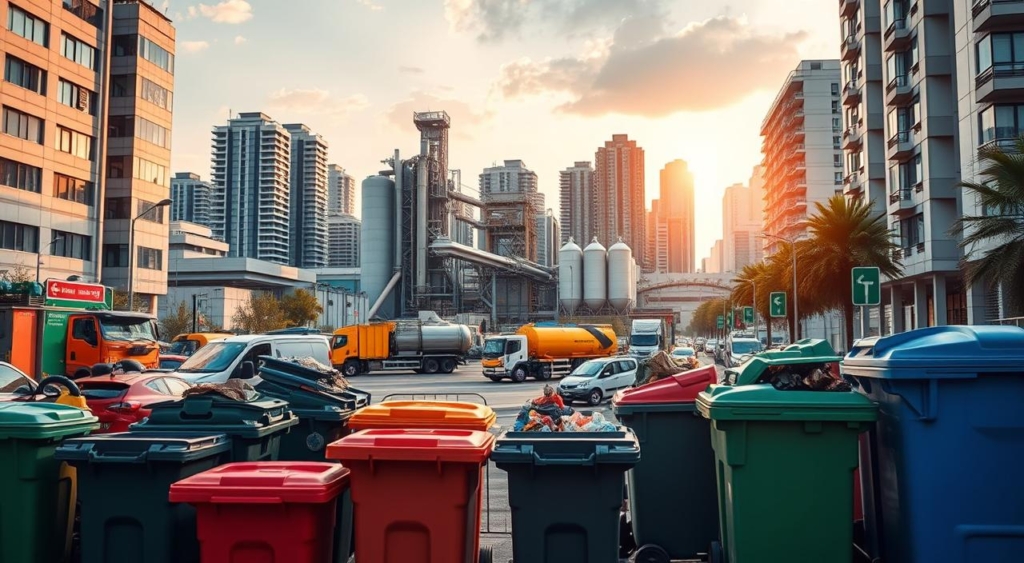
- Conduct a waste audit: Track current disposal habits to identify key areas for improvement. Note how much junk or construction debris your household or business produces weekly.
- Create a timeline: Break down tasks like setting up recycling stations or hiring licensed debris removal services by quarter. Aim to meet all targets by early 2025.
- Train your team or household: Use online guides from the London Waste and Recycling Board (LWRB) to explain new sorting rules and legal obligations.
Monitoring Waste Output
- Use digital tools: Apps like EcoBinTrack let you log waste volumes and track progress toward reduction goals.
- Review monthly: Compare data to adjust processes. For instance, if debris removal costs rise, explore compactors or better storage solutions.
- Stay flexible: Update your plan every six months using feedback from audits or local council updates.
Making these strategies routine ensures smoother transitions to the 2025 rules. Small adjustments today prevent bigger headaches later-starting with what goes into bins and how it’s recorded tomorrow.
Encouraging Sustainable Practices
London’s 2025 waste rules are opening up new possibilities. Communities and companies are finding ways to reduce waste and promote eco-friendly habits. Let’s look at how we can all lead greener lives.
Community Initiatives to Reduce Waste
Local projects are showing that small actions can make a big difference. Repair cafes let people fix things instead of throwing them away. Sharing libraries encourage the reuse of tools and books. Food waste schemes like the London Food Waste Initiative help share surplus groceries. These efforts reduce waste and bring communities together.
| Type | Example | Impact |
|---|---|---|
| Repair Cafés | Camden Makerspace workshops | Prevents 1.2 tonnes of rubbish removal yearly |
| Sharing Networks | Brixton Swap Shops | Cuts household waste by 20% |
Corporate Sustainability Programs
Businesses are now focusing on eco-goals. Retailers like Tesco are using circular design to cut down on packaging. Cleanout services like Clearabee offer eco-friendly waste removal options.
- Rubber Republic turns scrap tyres into playgrounds
- Recycle Now partners with SMEs to improve recycling rates
By taking these steps, both households and firms can stay ahead of regulations. Every action, from choosing eco-friendly rubbish removal to supporting local initiatives, helps build a greener future.
Resources for Businesses and Residents
Adapting to new waste regulations doesn’t have to be hard. London offers tools and guides to help with 2025 waste management policies. Whether you’re a business owner or homeowner, these resources make managing waste easier.
Guides from Local Government
Borough councils and the Greater London Authority provide free resources. Visit the GLA’s website for recycling handbooks or check Westminster City Council’s compliance checklist. These guides explain waste disposal requirements and trash removal schedules clearly.
Online Tools and Applications
Save time with digital solutions:
- Use MyLondonWaste to track collection dates and sort materials properly.
- Businesses can access compliance trackers via LondonRecycleNow to meet waste management policies deadlines.
- Download the “Waste Wizard” app for instant advice on disposing of hard-to-recycle items.
These tools provide step-by-step guidance, ensuring everyone stays aligned with 2025 regulations.
The Future of Waste Management in London
London’s 2025 regulations are a big step towards sustainable living. As the city evolves, new trends and plans will change how we handle waste. These changes aim to make today’s policies last for the future.
Trends Shaping Waste Policies
New strategies like extended producer responsibility and circular economy models are becoming popular. These approaches make manufacturers reduce waste and encourage recycling. Zero-waste initiatives also aim to reduce landfill use, with professional rubbish removal services helping streamline these efforts.
Long-term Goals for Sustainability
London’s 25-year environmental plan aims for net-zero emissions and cleaner streets. The 2025 rules help achieve these goals by improving waste removal efficiency and enforcing stricter policies. Future updates may expand on these steps, ensuring the city meets its climate targets. Businesses and households that adopt these practices now will be ready for upcoming changes.
Conclusion: Preparing for Change
London’s 2025 waste regulations are a big step towards a greener city. As the deadline approaches, understanding these changes is key for everyone. Let’s recap the essentials and consider next steps.
Summary of Key Points
New rules aim to improve recycling rates and reduce landfill use. Residents must adapt to updated garbage collection schedules and stricter waste segregation. Businesses face stricter compliance requirements, with penalties for non-compliance. Tools like smart bins and online guides can simplify the transition. Early adopters of sustainable practices may even cut costs while aiding environmental goals.
Call to Action for All
Start by checking how you throw away waste. Use free guides from London Council to learn about recycling. For big items, book professional junk removal or join cleanout events. Businesses need to check their waste systems now. Work with waste experts to make plans that follow the law. Use community workshops or online tools like Recycle Now’s guide to stay on track. April 2025 is more than a deadline. It’s a chance to change how we deal with waste. Taking small steps now will make London cleaner and more efficient for the future. Begin early, stay updated, and make these changes for a greener London.